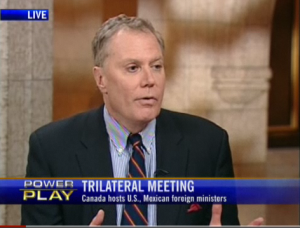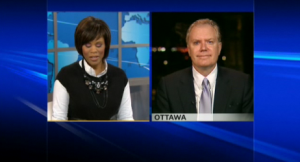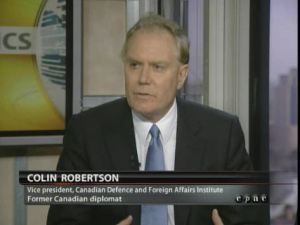Taking our continental partnership to the next level Globe and Mail Wednesday, February 2, 2011 by COLIN ROBERTSON
On Friday, Prime Minister Stephen Harper and President Barack Obama will officially launch negotiations to take our continental partnership to the next level. The two will lay out a plan designed to make the 49th parallel “a boundary, not a barrier” and deepen the perimeter, stretching from the Rio Grande to the North Pole and from the Atlantic to the Pacific, that already applies to our shared air defence.
There will be agreement to further institutionalize joint operations on intelligence, law enforcement and migration, and the sharing and pooling of information, as we’ve done for half a century through NORAD. The ultimate goal should be to make the flow of people, goods and services between the world’s single biggest bilateral trading relationship as easy as that enjoyed within the European Union. With an eye to elections, negotiations will start with the intent of getting it done within the calendar year.
The launch will cap a process begun in Toronto at the G8/20 meetings, when the Prime Minister told the President that the management “process,” endorsed at the leaders’ Ottawa summit two years ago, was going nowhere. Mr. Obama may “love” Canada, but he’s preoccupied by Afghanistan and Iraq, the Middle East, Iran, the Koreas and, of course, the continuing economic debacle that has put the Republicans in control of the House of Representatives. Getting this far meant perseverance in overcoming rear-guard resistance from the Department of Homeland Security.
We need to take this next step because the gains of the free-trade deals were realized a decade ago. The border, meanwhile, is thickening, and Canadians need better access if we’re to sustain our prosperity. Mr. Obama’s declaration that he’ll double U.S. exports gives us our opening because the dynamics of supply chain integration means we have to be part of this equation. His re-election hinges on his ability to create jobs and improve competitiveness. Our shared objectives will be to take a “perimeter” approach to mutual security, to “smarten up” the border, to take a blowtorch to the regulatory thicket and to strategically manage our shared environment and its resources.
Getting it done will be difficult. The once-welcoming screen door has been replaced with storm windows and increasing layers of weather-stripping. After 9/11, authority passed from Treasury officials, for whom more traffic meant more revenue, to Homeland Security, for whom compliance is everything. We need to reintroduce risk management into the equation.
Mr. Obama must convince Congress that Canadians can be trusted and that including us in the security blanket serves U.S. national security and economic interests. Differentiating between the northern and southern borders while avoiding a reopening of the immigration debate will take skill and finesse. There should be eventual provision for Mexico.
The Canadian debate will be noisy. The kabuki-like foreplay, with endorsements by business, former Canadian and U.S. ambassadors and former prime minister Brian Mulroney, plays to populist arguments about a secret corporatist agenda. Concerns over privacy, standards and sovereignty need to be assuaged and the case made for how the initiative serves the national interest.
Mr. Harper needs to confide in Liberal Leader Michael Ignatieff and the premiers. Last year’s agreement on procurement reciprocity demonstrated the value of our premiers reaching out to their gubernatorial counterparts. Canadian business and labour have to remind their head offices, customers and affiliates that continental supply-chain dynamics work to their advantage.
Taking the Canada-U.S. partnership to the next level makes sense. Sticking with the status quo means continuing incremental decline. Meantime, the global express is picking up speed.
Colin Robertson is vice-president of the Canadian Defence and Foreign Affairs Institute and a senior strategic adviser with McKenna, Long and Aldridge LLP.




